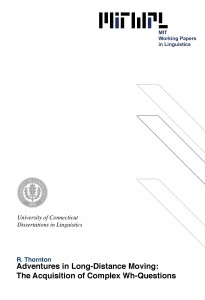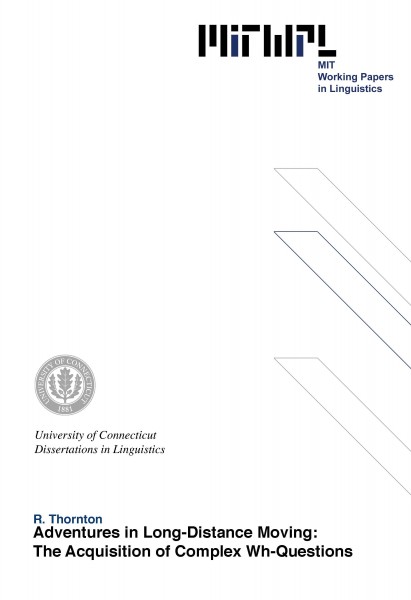Adventures in Long-Distance Moving: The Acquisition of Complex Wh-Questions
R. Thornton, 1990
This thesis investigates the acquisition of long-distance questions and the principles of Universal Grammar that govern them (Chomsky 1981;1986). The questions under investigation are all ones in which a Wh-phrase is moved from an embedded clause, leaving a Wh-trace at the extraction site. Using an elicited production methodology, it is demonstrated that even three-year-old children readily produce a variety of long-distance questions. The methodology is refined to probe children's knowledge of two principles that constrain production of long-distance questions. One principle governs wanna contraction, prohibiting contraction across a Wh-trace in extracting from infinitival clauses, as in (1). The second principle, the Empty Category Principle (ECP), restricts extraction from the subject of a tensed embedded clause, ruling out questions like (2) with an overt complementizer (that):
(1) *Who do you wanna help you?
(cf. Who do you want to help you?)
(2) *Who do you think that's in the box?
(cf. Who do you think is in the box?)
Another methodology, the Truth Value Judgment task, supplements the data from elicited production by studying a constraint that restricts the meanings that can be assigned to long-distance questions. This constraint of "Strong Crossover" prohibits Wh-movement over a pronoun with the same index, ruling out a bound interpretation of the pronoun, as indicated in (3):
(3) *Whoi does hei think ti has a hat?
(cf. Whoi thinks hei has a hat?)
The findings were that children adhered to the constraints on wanna contraction and Strong Crossover. In extracting from tensed clauses, however, several children consistently produced ungrammatical questions like (2), in apparent violation of the ECP. Other non-adult questions like (4) appeared. I call these "medial-Wh" questions.
(4) Who do you think who's in the box?
To explain the problematic data, I explore several current formulations of the ECP. A version by Rizzi (1990) is seen to provide a unified explanation of children's exceptional questions of both kinds. In this framework, these questions are not interpreted as ECP violations but, rather, as attempts by children to preserve the ECP. In sum, the findings support the view that, by three, children have mastered long-distance movement questions and the constraints that apply to them.
Theoretical Issues 1
Wanna Contraction 10
The Empty Category Principle 19
Strong Crossover 23
The Principle C Approach 28
The Principle B Approach 34
Weak Crossover 39
Limitations of Principle B 41
Experimental Studies 48
Experiment on Wanna Contraction 63
Elicitation of Questions from the Wanna Contraction Paradigm 63
Subjects 63
Experimental Design 64
Materials 65
Results 67
Experimental Studies on the ECP 72
Phinney (1981) 72
Elicitation of Questions from the That-Trace Paradigm 78
Subjects 79
Experimental Design 80
Materials 80
Results 83
Experimental Studies on Strong Crossover 92
Roeper, Rooth, Mallis and Akiyama (1985) 99
Experimental Design 100
Critique of Roeper et al. (1985) 104
McDaniel and McKee (in press) 118
Theoretical Proposals 134
A Representational Account: Roeper et al. (1985); Roeper
(1990) 136
A Derivational Account of Crossover Violations: Lebeaux
(1988) 142
New Experiments on Strong Crossover 150
Experimental Innovations 152
Theoretical Issues 155
Truth-Value Judgment Experiments of Strong Crossover 163
Subjects 163
Materials and Procedures 163
Results 182
Discussion 188
Elicitation of Crossover and Bound Pronoun Questions 193
Subjects 195
Materials 195
Results 199
Children's Exceptional Questions 204
Wh-movement Across Languages 209
Movement Options 210
Partial Movement 215
Wh-Copying 218
Medial-Wh Questions and Parameter Theory 222
Wh-Movement Parameters 223
The Subjacency Parameter 227
The Derivation of Medial-Wh Questions 231
ECP Explanations of Medial-Wh Questions 240
The ECP in the Lasnik and Saito Framework 240
ECP Parameter-Based Explanations 244
The ECP in the Rizzi (1990) Framework 252
Spec-Head Agreement Across Languages 260
Children's Long-Distance Questions 269
Evidence against That-trace Questions as ECP Violations 272
An ECP Preservation Account of That-Trace Questions 276
A Parallel Analysis of Children's Medial-Wh questions 285
Why Children Use an Overt Form 295
Converging on the Adult Grammar 301
Relative Clauses 305
A Puzzle 309
Issues of Competence and Performance 310
References 322

